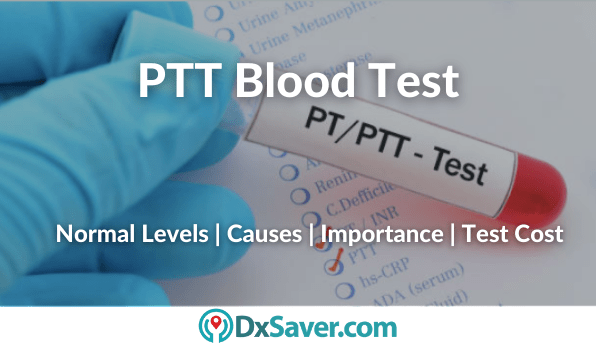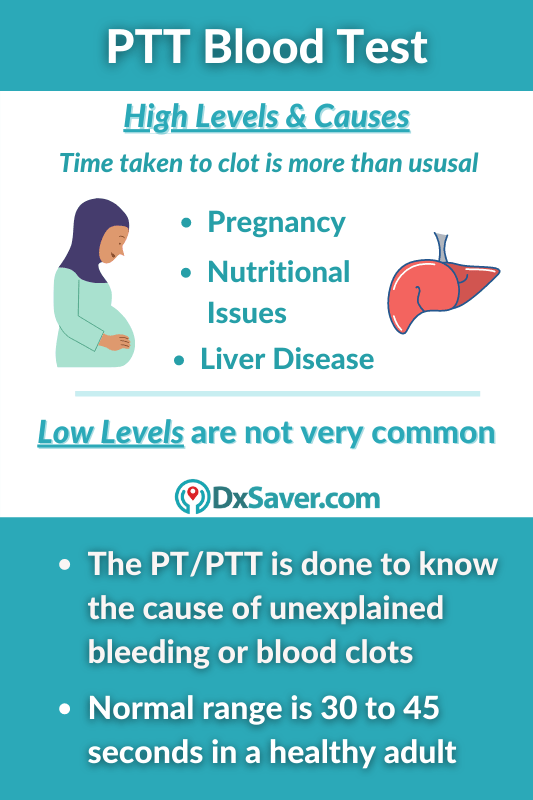
When you have a blood loss, the human anatomy functions in a way to help the blood loss stop by making a blood clot or otherwise known as coagulation to prevent excess blood loss from the injury. Time taken to clot the blood is vital. In order to evaluate the time taken to clot, the blood loss is done by taking PTT (Partial Thromboplastin Time) test. Your doctor will order this PTT blood test if you have any bleeding or clotting disorder.
This test is also done as a pre-surgical test, the PTT blood test helps your doctor determine the likelihood of excessive bleeding or clotting to determine risks during and/or after surgery.
The article below covers all the significant topic asked on PTT Blood tests, their normal range, and more.
- PTT Blood Test Cost
- What is the PTT blood test?
- What is PTT in blood & why is it important?
- How is the PTT blood test performed?
- What’s the Difference Between a PT Test & a PTT Test?
- Is there any preparation required before the Test?
- Are there any risks in the PTT blood test?
- PTT blood test results explained
- PTT blood test: High
- PTT blood test: Low
- Providers Locations
For our readers, who are very much interested in knowing the PTT Blood test cost beforehand, we would like to begin with that section.
PTT Blood Test Cost
The cost of the PTT blood test ranges between $29 and $69 in different labs and facilities across the U.S. No prior appointment is required. Compare the price, order your test online and visit the nearest lab during lab business hours. Complete the procedure and get the results in your email in 2 to 3 business days. Doctor consultation is also available for further treatment or for any kind of medical advice.
The following table shows the PTT blood test cost at our partner lab network with over 4500 laboratories (CLIA – Certified) network located across the U.S.
Name of our Partner Lab | Book Online |
HealthLabs
| Offer Price$29 |
Cost of PTT blood test cost with insurance
Many health insurance policies in the U.S. do not cover the cost of the PTT blood test. Also, the coverage offered by private health insurance policies and national health insurance programs varies widely. So we recommend you to check with your insurance company.
Our PTT blood testing providers do not accept any health insurance. But, on request, they can provide you with a receipt containing all the details like the name and code of the test, and CPT code which is necessary for insurance reimbursement purposes.
What is the PTT Blood Test?
When your body undergoes heavy blood loss or nasal bleeding, a typical healthy human being will enter a phase called coagulation or blood clot. The human anatomy by default attempts to stop the bleeding by patching up the area of bleeding. Platelets are a type of cells that gather to cover the damaged tissue and stopping the blood loss. Sometimes, if you have high PTT levels, then the time taken is far longer than healthy human people, causing heavy blood loss.
There are coagulation factors that are in form of proteins are the core elements for the body to form blood clots to help stop bleeding. When you have too little or too much of any coagulation factor this may cause excessive bleeding/clotting.
Thus, the Partial Thromboplastin Time (PTT) and Prothrombin Time (PT/INR) test is taken to measure the duration needed for your blood to clot. PTT/PT blood tests give an indication of how well your body is reacting to a blood loss to protect itself from over bleeding.
What is PTT in blood & why is it important?
The PTT blood test is useful if you have frequent nose bleeding, heavy and prolonged menstruations, swollen joints that are painful, and easy bruising. Sometimes, this blood test is also recommended when you see blood in urine along with a UTI test.
Before undergoing surgery your surgeon needs to look at the PT/PTT values to make sure that there will be no serious blood loss in your body. The Prothrombin test is also ordered as a backup test while evaluating the functioning of the liver.
Following are the medical conditions where a PTT blood test is ordered:
- Check the function of specific coagulation factors. (To monitor any bleeding disorders such as hemophilia)
- Any unexplained heavy bleeding
- Bruise easily
- Have a blood clot in a vein or artery
- Have liver disease (Liver diseases can cause problems with blood clotting)
- As a pre-surgery protocol. Surgery can cause blood loss, so it’s vital to know if you have any clotting disorder.
- Have had multiple miscarriages
- Monitor people taking heparin, a type of medicine that prevents clotting. In some bleeding disorders, the blood clots too much, rather than too little. This can cause heart attacks, strokes, and other life-threatening conditions. However, taking too much heparin can cause excessive/dangerous bleeding.
What’s the Difference Between a PT Test and a PTT Test?
PT is expanded as Prothrombin Time and PTT is expanded as Partial Thromboplastin Time. Both PT and PTT evaluates how fast your blood is able to clot the excess bleeding and detects any blood clotting disorders. But the measurement of the PT and PTT tests takes a different pathway to assesses how your blood goes through in order to form a clot.

How is the PTT blood test performed?
As the name suggests, the PTT blood test is a simple blood test. During this test, a lab technician or a phlebotomist will cleanse the skin with an antiseptic and place an elastic band around the upper arm so that the vein becomes visible and swells with blood. He/she then injects a needle and draws a sample of blood in a test tube. After the blood is drawn, he covers the injected area with a band-aid to stop bleeding. The typical blood specimen is then sent to the lab for analysis.
It takes less than 10 minutes to perform this test.
Is there any preparation required before the test?
You will be asked to stop the following medications if any:
- Heparin
- Warfarin
- Aspirin
- Antihistamines
- Vitamin C
- Chlorpromazine
Other than these, there are no special preparations required before the test. You can continue to have regular food plans and usual daily activities.
Are there any risks in the PTT blood test?
There is no possible risk or complication in taking the PTT blood test. You might have slight pain or bruise in the injected area for a very little period.
PTT blood test results explained
Typically, the PTT levels in a healthy adult who has no clotting disorder conditions will have their normal PTT values ranging from 30 to 45 seconds. If your PTT results are elevated more than 45 seconds then it indicates that your blood clot takes more than 45 seconds for your body cells to patch the bleeding area, thus resulting in a heavy blood loss.
Sometimes your PTT levels are higher than normal, which is usual. If you’re pregnant or vitamin K deficient, then you’re levels are tend to be higher .
Abnormal PTT Blood Test Results
Normal PTT values are between 30 to 40 seconds. Abnormal levels don’t indicate any disease in particular, they provide insights only about the time taken for your blood to clot.
If you take this PTT test because you’re taking heparin and monitor your health condition, your PTT results to be more like 120 to 140 seconds.
High PTT levels
Elevated PTT values may be a result of the following medical conditions:
- Antibodies, including cardiolipin antibodies
- Deficiency of blood clotting factors
- Disseminated intravascular coagulation (a disease in which the proteins responsible for blood clotting are abnormally active)
- Reproductive conditions, (pregnancy, or recent miscarriage)
- Hemophilia A or B
- Leukemia
- Hypofibrinogenemia (deficiency of the blood clotting factor fibrinogen)
- Nutritional issues, such as vitamin K deficiency and malabsorption
- Liver disease
- Use of medications, such as the blood thinners heparin and warfarin
- Von Willebrand disease (a disorder that causes abnormal blood clotting)
Low PTT levels
If your number is lower than normal, which doesn’t happen often, it indicates that your blood clots faster than the usual range. Sometimes this can be serious health conditions such as heart attack, Deep Vein-Thrombosis (DVT), or stroke, your physician will order a D-dimer test and a few other tests to formulate a diagnosis accordingly.
Providers Locations
The PTT blood test can be done in any of the following locations across the U.S. by visiting the nearest lab. To know the PTT blood test cost, refer to the first section of the article.
- Alabama
- Arizona
- Arkansas
- California
- Colorado
- Connecticut
- Delaware
- Florida
- Hawaii
- Georgia
- Idaho
- Illinois
- Indiana
- Iowa
- Kansas
- Kentucky
- Louisiana
- Maine
- Michigan
- Minnesota
- Mississippi
- Missouri
- Montana
- Nebraska
- Nevada
- New Hampshire
- New Mexico
- North Carolina
- North Dakota
- Oklahoma
- Oregon
- Pennsylvania
- Puerto Rico
- South Carolina
- South Dakota
- Tennessee
- Texas
- Utah
- Vermont
- Virginia
- Washington
- West Virginia
- Wisconsin
- Wyoming
Frequently Asked Questions
Will insurance cover my testing cost?
No, insurance will not be covered in the billing. However, they will provide you a receipt for insurance reimbursement purposes.
How should I book my appointment?
You can choose the most suitable provider from above and make an appointment by following the instructions mentioned by them.
Can I cancel my lab test order?
Yes, you can cancel your lab test order anytime before your testing. A refund will be initiated after deducting the cancellation fee. However, cancellation is at the discretion of the provider.
Do the providers offer result interpretations?
Yes, a few providers may provide doctor consultation who will take you through the results and provide clarification if needed.
How do I receive my report?
To ensure your privacy, the test report will be mailed to you by the provider.
Other topics you may be interested in:-
- H Pylori Test Cost
- LDH Test Cost in the US
- Ferritin Test Cost in the US
- Is Itching a Symptom of STD?
- What is Lymphocytes in Blood Test?
- Signs and Symptoms of Oral Syphilis
- At-Home STD Testing Kit Providers in the US
- Lung Cancer Stages and their Treatment
- STD Testing Cost in the US
- Types of STDs that cannot be cured
- Types of STDs That Cause Mouth Sores Symptoms in Men and Women
- Cost of Planned Parenthood STD Testing Vs. Other Labs/Clinics Near You
- Importance of Progesterone & Fertility Testing
- How much does an MRI Scan Near you Costs?
- C-Peptide Normal Levels, Test Results & Treatment
- Oral STDs: Names, Symptoms, Treatment and Testing Cost
- Herpes Vs. HPV: Differences, Symptoms, and Testing Cost
- Do STDs cause Blood in Urine? Know more on Other Symptoms of STDs






